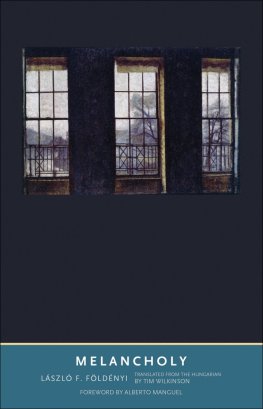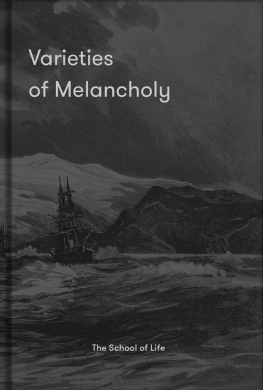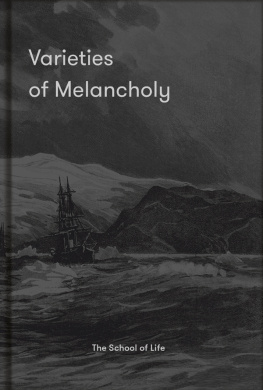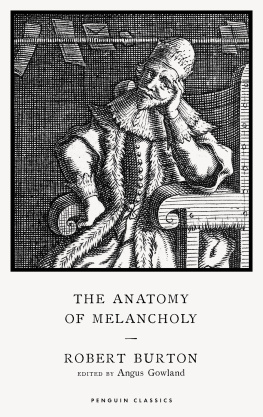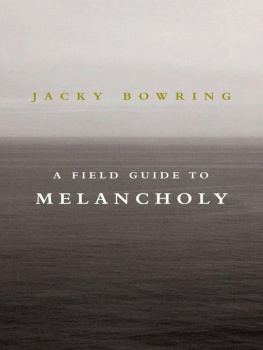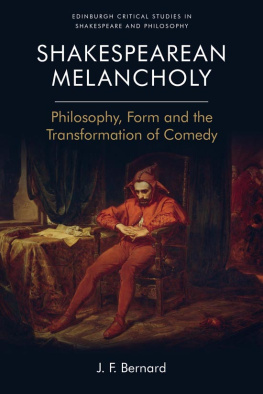Melancholy
Melancholy
Melanklia
LSZL F. FLDNYI
TRANSLATED FROM THE HUNGARIAN
BY TIM WILKINSON
FOREWORD BY ALBERTO MANGUEL


The Margellos World Republic of Letters is dedicated to making literary works from around the globe available in English through translation. It brings to the English-speaking world the work of leading poets, novelists, essayists, philosophers, and playwrights from Europe, Latin America, Africa, Asia, and the Middle East to stimulate international discourse and creative exchange.
Foreword by Alberto Manguel copyright 2016 by Yale University.
English translation copyright 2016 by Yale University. Translation by Tim Wilkinson.
Originally published in Hungarian as Melanklia.
1984, 1992, 2003, 2015 Lszl F. Fldnyi, Budapest.
1988, 2004 Matthes & Seitz Berlin Verlagsgesellschaft mbH.
English-language edition published by arrangement with Eulama International Literary Agency.
All rights reserved. This book may not be reproduced, in whole or in part, including illustrations, in any form (beyond that copying permitted by Sections 107 and 108 of the U.S. Copyright Law and except by reviewers for the public press), without written permission from the publishers.
Yale University Press books may be purchased in quantity for educational, business, or promotional use. For information, please e-mail (U.K. office).
Set in Electra and Nobel type by Tseng Information Systems, Inc.
Printed in the United States of America.
Library of Congress Control Number: 2015953464
ISBN 978-0-300-16748-1 (cloth : alk. paper)
A catalogue record for this book is available from the British Library.
This paper meets the requirements of ANSI / NISO Z 39.481992
(Permanence of Paper).
10 9 8 7 6 5 4 3 2 1
To Marianne Bara
CONTENTS
FOREWORDAlberto Manguel
The notion that the melancholic temperament is a characteristic of the creative mind has its roots in a fragment ascribed to Aristotle, or, rather, to the Aristotelian school. Throughout the centuries, especially in the West, this notion acquired both positive and negative connotations and was explored by relating it to somatic causes, psychic inclinations, and spiritual choices, and as a reaction to certain natural or cultural environments. The variety of such ascriptions (explored in their astonishingly vast range in Lszl Fldnyis Melancholy) is indicative of the notions lasting attraction. From Aristotle on (and probably long before), philosophers, artists, psychologists, and theologians have attempted to find in the almost indefinable state of melancholia the source of the creative impulse, and even perhaps that of thought itself. Every study of melancholia (notably Saturn and Melancholy by Raymond Klibansky, Erwin Panofsky, and Fritz Saxl, but also legions more) is, in some sense, a reflection on the intellectual act itself.
It could be said that every one of Fldnyis books is a reflection on that same subject. A specialist in aesthetics and artistic theories, Fldnyi (who was born in Hungary in 1952) is also an essayist and philologist. His numerous books include studies of the young Georg Lukcs, the Romantic painter Caspar David Friedrich, Goya, and the reading of works of art (The Veil of the Veronica), as well as works on Heinrich von Kleist, on William Blake, and on the contrasting ideas of history in Dostoyevsky and Hegel, this last in a short essay with the irresistible title Dostoyevsky Reads Hegel in Siberia and Bursts into Tears. Melancholia continues and deepens these reflections about the relationships among art, emotion, philosophy, and religion.
The Aristotelian quotation (which Fldnyi places in the first chapter of his book) is not a statement but a question: Why is it that all those who have become eminent in philosophy or politics or poetry or the arts are clearly melancholic? Notable in this question is the confidence implied in the words all those as well as in the specific eminent: melancholia is, for Aristotle, the pervading and necessary state of every creative act that is generally recognized as important. The assumption behind the Aristotelian question is that there is indeed such a state that allows for or even fosters creation. Inspiration (the Muses, the Holy Spirit, the poetic experience of the world) might provide the external spark, yet in order to burst into creative flames, the inspired subject must be melancholic. But what exactly is this preconditioned temperament common to all notable creators? Over the ages, the melancholic condition has been described as sad, meditative, withdrawn, reflective, morose, ailing, depressed, and bleakly ecstatic, and yet none of these epithets embraces everything that is meant by the word melancholia.
Jorge Luis Borges, in one of his late stories, to describe the creative state in the Aristotelian question, imagined a primitive race who engage in a curious ritual of literary creation. From time to time, one of the men will utter six or seven enigmatic words. If the words excite no attention, nothing else happens. But if the words move the audience, everyone will stand apart from him in holy dread. No one will look at him or speak to him, not even his mother. He is no longer a man but a god, whom all have the right to kill. The state this privileged man has entered is that of melancholia.
A related term, nostalgia, was coined by the Swiss physician Johannes Hofer in his 1688 medical dissertation, from the Greek nostos, homecoming, and algos, pain, to describe the mental state of Swiss soldiers on postings far away from their native mountains. Nostalgia carries its own etymological definition; melancholia, in spite of everything that has been written about it, continues to beg the Aristotelian question.
Though this is not part of Fldnyis exploration, it can be said that not only people but also places can suffer from melancholia, and a vocabulary of poetic fallacies has emerged to characterize some specific geographic instances: the saudade of Lisbon, the tristeza of Burgos, the mufa of Buenos Aires, the mestizia of Turin, the Traurigkeit of Vienna, the ennui of Alexandria, the ghostliness of Prague, the glumness of Glasgow, the dispiritedness of Boston, and the hzn of Istanbul, the last a Turkish word whose Arabic root (it appears five times in the Quran) denotes a feeling of deep spiritual loss but also a hopeful way of looking at life. For the Turkish Sufis, hzn is the spiritual sadness we feel because we are not close enough to God; for Saint John of the Cross, this melancholia causes the sufferer to plummet so far down that his or her soul will, as a result, soar to its divine desire. Hzn is therefore a sought-after state; it is the absence, not the presence, of hzn that causes the sufferer distress.
However, as Fldnyi points out, it was not suffering and malaise that were first associated with melancholia, but rather excellence and extraordinariness. Two centuries after Aristotle (or earlier, if we accept Fldnyis contention that there are implicit references to melancholia in Homer), the extraordinary quality of the melancholic condition was thought to stem from an excess of black bile, one of the four bodily humors described by Hippocrates in the fifth century BCE. Melancholia then becomes a psychosomatic condition.
Next page

